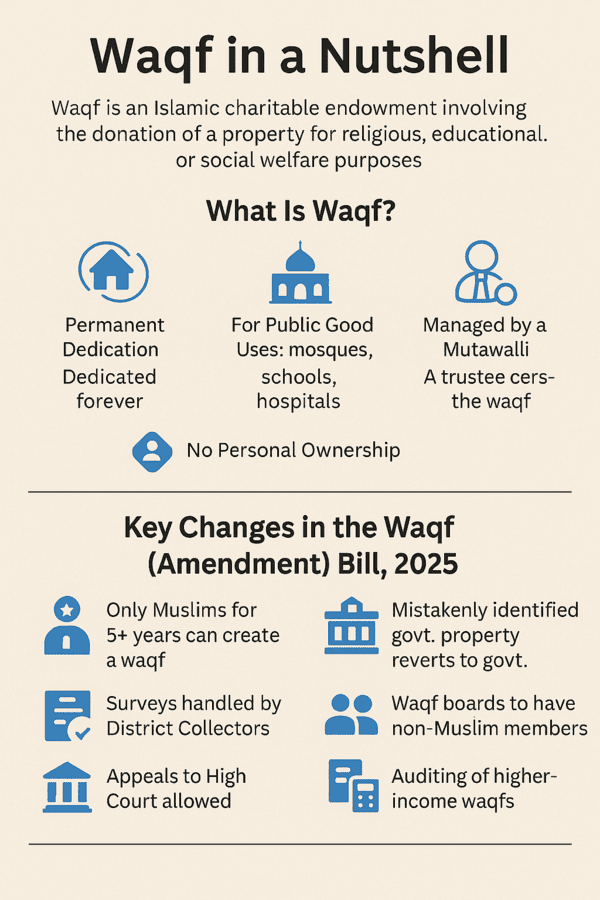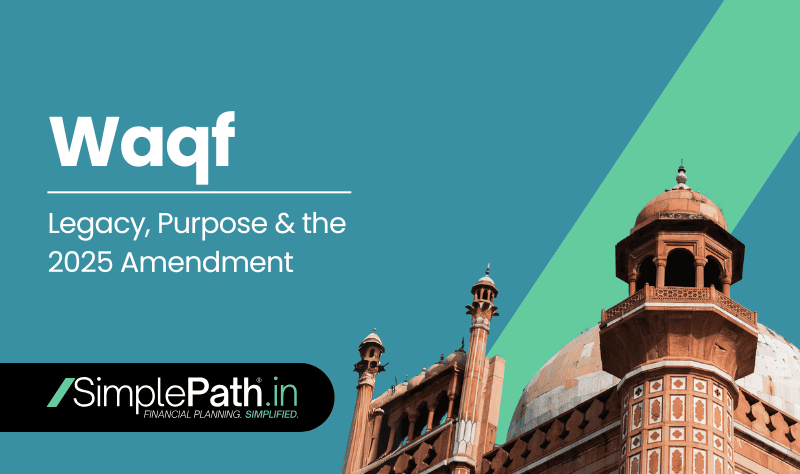Waqf, a term often unfamiliar outside Islamic finance and charitable institutions, carries immense socio-religious and economic value. It represents the concept of permanently dedicating property for a charitable cause, with the idea that the benefits of the asset will serve the community indefinitely.
What is Waqf?
Derived from Arabic, ‘waqf’ means to stop, contain, or preserve. In practice, it refers to a perpetual endowment—land, buildings, or assets—donated by a Muslim individual for religious, educational, or social welfare purposes.
Once declared, the ownership is transferred to God, and the property:
- Cannot be sold, gifted, or inherited
- Is managed by a trustee (Mutawalli)
- Must generate income or utility for a public or charitable good
Real-world Examples of Waqf:
- A mosque built on donated land
- A school funded from rental income of a waqf building
- A hospital offering free services sustained by waqf earnings
This model shares similarities with modern endowments, where the principal remains untouched while the returns are used for social causes.

Why Was an Amendment Needed?
India has over 6 lakh waqf properties, yet widespread concerns about mismanagement, encroachments, and lack of transparency have persisted for years. The 2025 Waqf (Amendment) Bill aims to modernize waqf governance, improve transparency, and bring reforms that reflect current administrative challenges.
Key Changes in the Waqf (Amendment) Bill, 2025
1. Clear Ownership Rules:
- Only those who have practiced Islam for at least five years and own the property can declare it as waqf.
- The concept of “waqf by user” (declaring a property as waqf based on long-standing use) has been scrapped.
- If government land is mistakenly classified as waqf, it will revert to the government.
2. Administrative Overhaul:
- District Collectors will now survey and decide ownership in disputes—previously handled by the Waqf Survey Commissioner.
- A digital portal will manage waqf registrations and improve transparency.
3. Inclusivity in Governance:
- The Central Waqf Council and State Waqf Boards will now include non-Muslim members.
- Boards must represent Shia, Sunni, Bohra, Agakhani, and backward Muslim communities. Two seats are reserved for women members.
4. Legal Recourse Strengthened:
- Appeals against Waqf Tribunal decisions can now be filed in the High Court within 90 days—providing stronger judicial oversight.
5. Separate Waqf Boards:
- Provision to create independent waqf boards for Bohra and Agakhani communities—enhancing sect-specific administration.
6. Financial Oversight:
- Properties with income above ₹1 lakh/year will be audited by government-appointed auditors.
- The CAG (Comptroller and Auditor General) may audit waqf accounts to further ensure accountability.
A Divisive but Decisive Step?
The bill has sparked debate.
Supporters argue it strengthens governance, ends loopholes, and brings digital modernization.
Critics worry it dilutes community autonomy, especially with non-Muslim members and stronger state oversight.
Regardless of one’s stance, the 2025 Waqf Amendment signals a shift: from faith-managed legacy systems toward a digitally governed, legally structured, and inclusive model of managing religious endowments.
In Conclusion: Understanding waqf isn’t just about religious charity—it’s about land rights, social justice, financial sustainability, and community empowerment. As India modernizes its laws, the waqf system stands at a crossroads between tradition and transformation.





